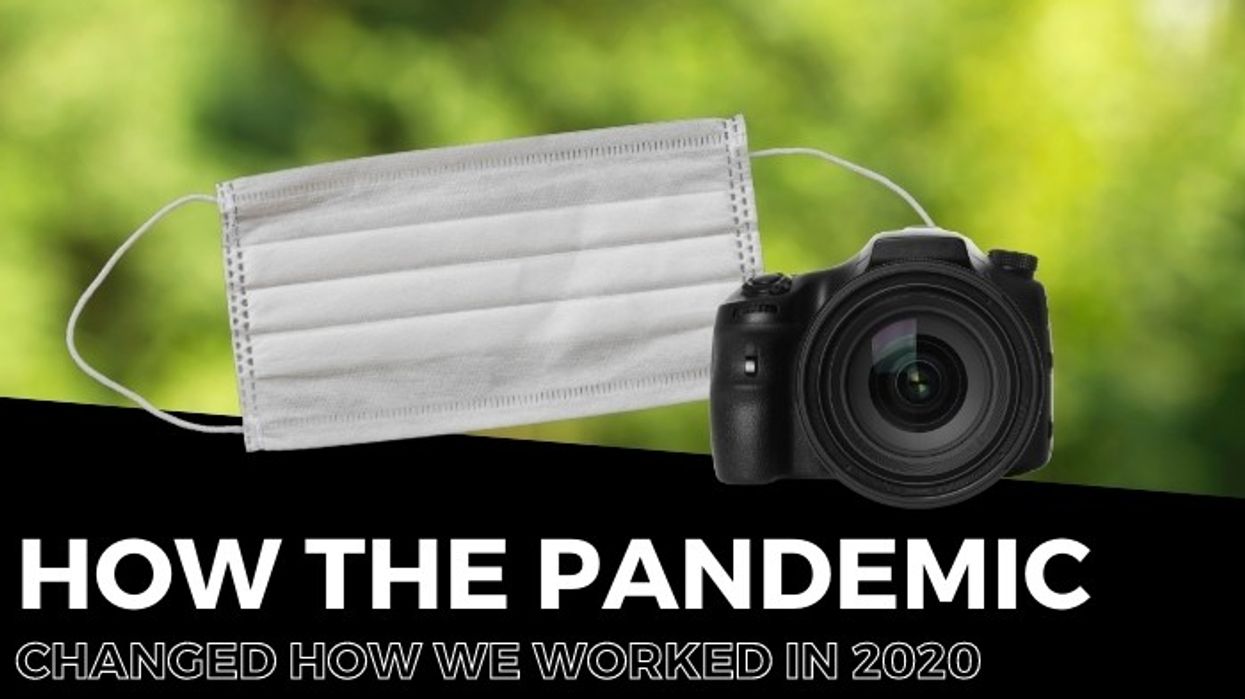How the Pandemic Changed How We Worked in 2020
COVID-19 made the year a total shit show, but it did offer some hope.

Like many of you, No Film School wants to forget 2020 as quickly as possible. When the pandemic hit, it left many people without jobs, closed hundreds of businesses, shut down schools, and divided the United States over a piece of cloth.
You wonder, if Tom Cruise had ranted to the entire country at the start to wear a mask, would everyone be better off today?
Thankfully, there seems to be hope in the coming months with multiple vaccines being approved across the world, so we can get back to some form of normalcy.
Even with social distancing, the entertainment industry found its way.
New remote workflows popped up with greater urgency with companies like Frame.io leading the way. Camera manufacturers like Sony, Canon, Panasonic, Nikon, and Fujifilm developed software that allowed many of its cameras to be used as webcams. Hundreds of software companies allowed us to use their programs for free. And internet service providers like Spectrum, who without question is the biggest piece-of-shit company in terms of customer service, gave away free internet to educators.
Another bright spot was those who stepped up to donate money and time. Netflix launched a $100 million fund for those in need. Sony gave out $100 million to those affected by COVID-19 as well. Millions of others donated to local charities and food banks. It goes to show, politics aside, we can come together to help everyone in need.
Zoom and Skype are now part of our daily lives and workflows. It's not the best way to energize creativity, but it beats talking over the phone.
While many of the trade shows and in-person events were canceled, dozens were brought into the virtual space, allowing us to find out about new products or learn new workflows.
Without question, 2020 was the year of the camera. Canon released the EOS R5 and R6 to much uproar. Then a few months later dropped the C70, a compact cine camera. Sony finally released the a7s III and new camcorder in the FX6. Blackmagic dropped a 12K bomb with the URSA Mini Pro 12K. RED introduced its first sub-$8,000 global shutter camera in Komodo. Nikon refreshed its Z ("Zed") mirrorless lineup. Panasonic gave us the S5, and then dropped us with a firmware update that puts it in the same class as the more expensive S1H. Z Cam went full-frame with the E2-F6 and Kinefinity went 8K with its MAVO Edge 8K, which also shoots internal ProRes RAW.
It's a great fucking time to be a creator.
You can pick up just about any camera and be satisfied with the images they create. Tack on an Atomos Ninja V or Shogun 7, and you can shoot ProRes RAW for even more latitude.
There are no more excuses. If you want to nitpick, go ahead, we do it daily, but as a creator, waiting for a sample rate should not be the thing holding you back. After 10 years of publishing content, we can confidently tell you that the camera you buy will be replaced by something newer and better. And that's okay.
Technology is not going to make you a better filmmaker, getting out there and shooting is going to make you better.
So what can we take away from 2020 as creators?
One is to become financially savvy going forward. Know your worth and save your money. It's not on us to tell you how to live or what you should spend your money on, but try to find ways to put more money into your bank account. If it's just shaving a few dollars here and there by not impulse buying, it can go a long way to adding dollars into your savings when another pandemic hits.
When it comes to pitching your film or series, assume it will be by Zoom. That in itself can be a good thing, especially if you get nervous speaking in a room full of people. With Zoom, you can quite literally set up a teleprompter behind the camera and load in your talking points. You're also going to want to include more visual assets, whether that be a trailer, teaser, pitch deck, or references. Because even with Zoom, there is that slight disconnect between people. But with Zoom, it's a hell of a lot easier to visually present your idea. Your screen is their screen, and that is a big advantage in keeping their attention.
Theaters are struggling, but they won't die off. Well, at least this decade.
The moviegoing experience is too ingrained as a source of entertainment. It's our first date. It's our escape from our jobs. It's how families spend a Sunday afternoon. It's the only way we can get Nestle's Dibs. So if one of your dreams is to see a movie you made on the silver screen, don't worry. It will be there, no matter how many streaming sites start releasing movies online.
But most of all, be patient. Even when production restarts (and it has) there's going to be shutdowns when someone catches the virus. It's inevitable. Having a little humility will go a long way.
See you in 2021.
Still feeling nostalgic about 2020? Then check out the rest of our Year in Review 2020 coverage for more of our top picks, industry trends, and end-of-year takes.














